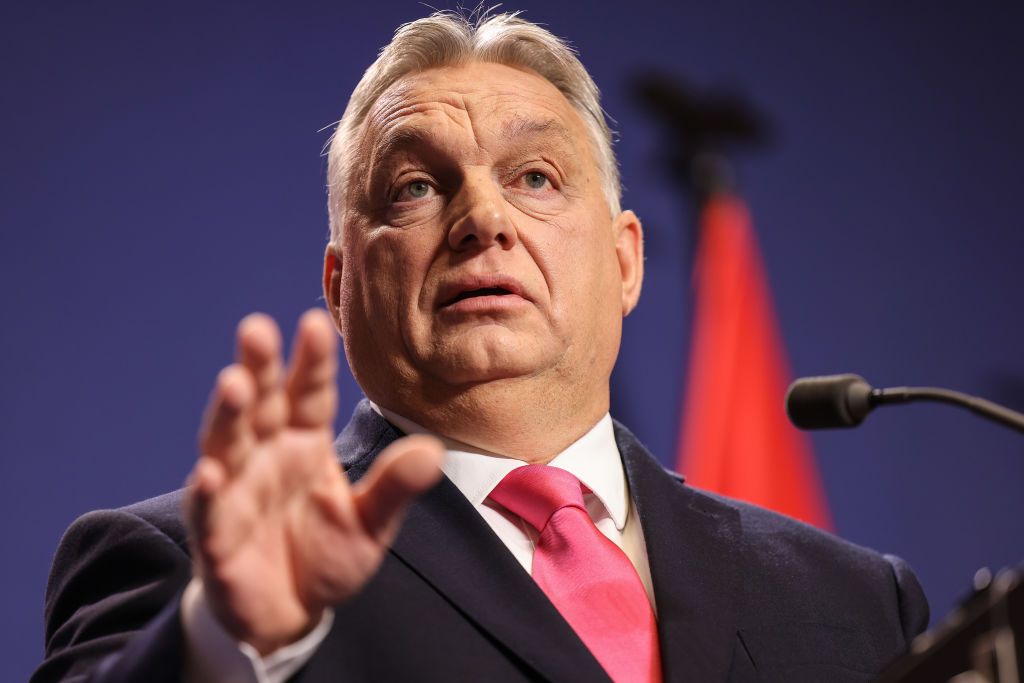Orban says Ukraine should be 'buffer zone' between Russia and West

Hungarian Prime Minister Viktor Orban said that Ukraine should be left as a "buffer zone" between Russia and the West, with allies giving the country security guarantees but not accepting it into the EU or NATO.
Hungary and Ukraine have had a contentious relationship that has worsened since the beginning of Russia's full-scale invasion. Orban has maintained close ties with Russia, bucking the united front that the EU has tried to present in support of Ukraine.
"Whether we like it or not, whether Ukrainians like it or not, Ukraine is on the map where it is. The best prospect for it would be to form a buffer zone between Russia and the West — with security guarantees, of course," Orban said during a debate with former Austrian Chancellor Wolfgang Schussel, according to an excerpt from the conversation published by Die Presse on Feb. 11.
"If this fails, Ukraine will lose its land. The Russians will destroy Ukraine again and again and again. Russia will never accept an EU and NATO member like Ukraine on its doorstep. Never."
At the same time, Orban believes that NATO should have started membership talks with Ukraine at the Bucharest summit in 2008 "when Russia was too weak to block NATO expansion that also included Ukraine."
"We failed to successfully complete the accession negotiations with Ukraine and Georgia, thereby losing Ukraine's prospects as a future member of the European Union and NATO," he said.
Hungary has repeatedly opposed Ukraine’s accession to NATO and the European Union and blocked the EU's financial support for Ukraine. Orban previously said that Ukraine is a financially "non-existent" and "no longer sovereign" state due to its "dependence" on international support.
Responding to Schussel's remark that an immediate ceasefire "would mean a de facto defeat for Ukraine," Orban said that "it depends on how you see the future," suggesting that Ukraine could lose more territory if the hostilities continue.
Orban also said that Russia would never take Ukraine seriously as a partner in negotiations, adding that "they will only negotiate with the United States, and if we are clever, probably with Europe too."
Ukrainian officials have repeatedly said that negotiating a ceasefire without achieving significant results on the battlefield would just give Moscow time to prepare for an even bigger offensive. Peace talks could force Ukraine to cede territory to Russia, which is widely unpopular among the Ukrainian population.
Ukraine laid out its 10-point "peace formula" in November 2022. One of the key points as a precondition for starting peace talks is the full withdrawal of Russian troops from Ukrainian territory, including the regions illegally annexed by Russia in 2022.
During the debate, Orban rejected the notion that Ukraine joining NATO would protect Europe since almost all EU members are already members of NATO, "which is much stronger than Russia."
"There is no risk of Russia attacking a NATO member," Orban said, while several NATO commanders and other alliance leaders have warned in increasingly stark terms in recent months about the dangers of a war between Russia and NATO and what impact it could have across Europe.
Orban also claimed that Europe is "not in a position" to provide Ukraine with sufficient weaponry to win the war because Europeans are allegedly unhappy with how much defense aid the EU already supplies to Ukraine.
"We cannot afford to fund Ukraine to enable it to achieve a military victory," he added.
Orban blocked a 50 billion euro ($54 billion) EU financial aid package for Ukraine during an EU summit last December. Orban dropped his opposition to the four-year support package on Feb. 1, explaining it by the establishment of a control mechanism that would ensure Hungary's funds "will not end up in Ukraine."
Brussels has yet to decide on the format of further defense assistance for Ukraine.














